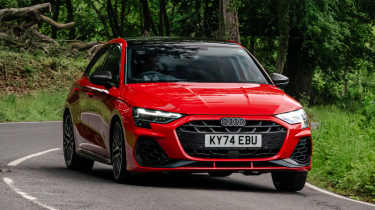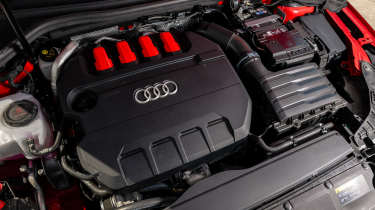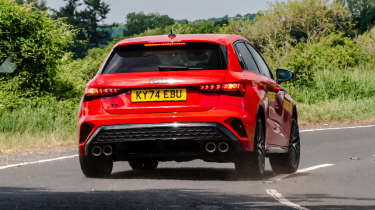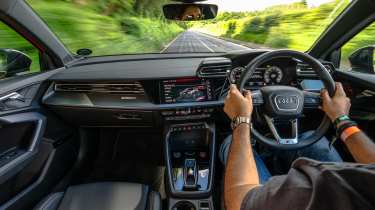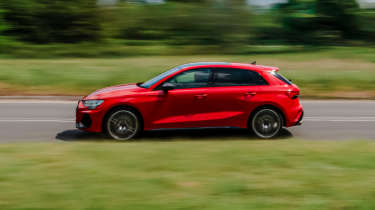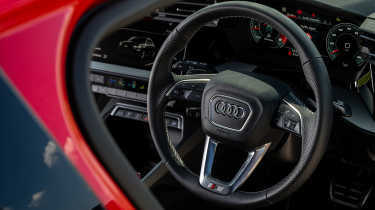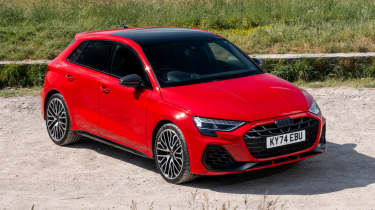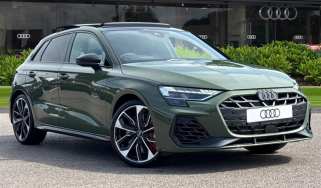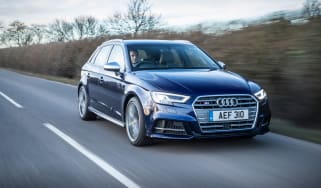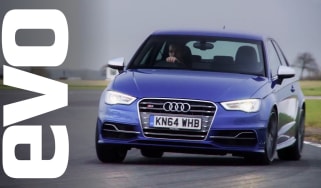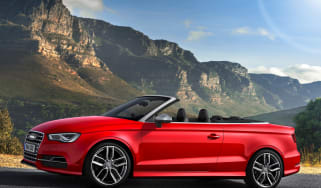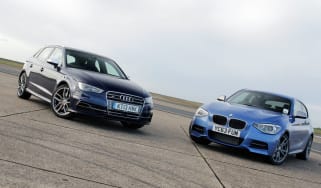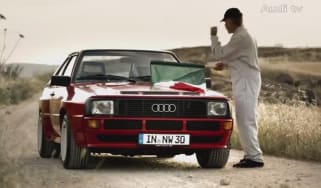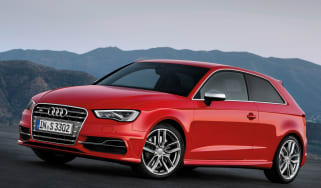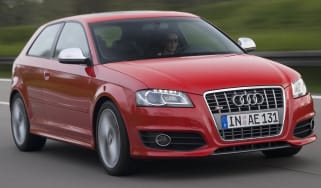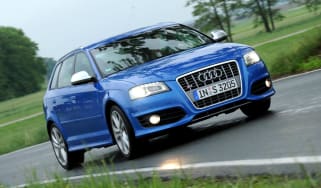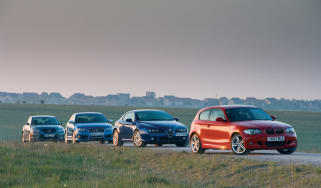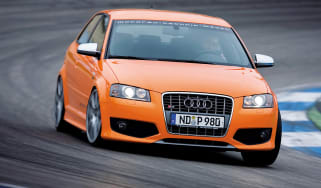Audi S3 review – the RS3’s deputy is now a worthy hot hatch
A few choice upgrades have bestowed the latest Audi S3 with something it’s not really had in its 26 years – actual driver appeal
evo Verdict
As of a 2024 update, the S3 graduated to become a model beyond simply the stepping stone rung on the A3 ladder before the mega-bucks RS3. Thanks to Audi's fitment of the new torque splitter rear diff and other tinkering besides, it became a car worth a second look for those who enjoy driving. It’s been a long time coming, but it feels like Audi has put driver satisfaction closer to the top of its priorities with this latest S3, and it’s the best one yet as a result.
We first encountered an S3 at the turn of the century, on some very nondescript, featureless roads around the Munich suburbs. It was buttercup yellow with chrome mirrors, a set of flat-faced, six-spoke alloy wheels and a 207bhp, 1.8-litre four-cylinder turbocharged engine driving a Haldex four-wheel-drive system via a rather slow and unremarkable six-speed manual gearbox. It was far from an inspiration to drive; aspirational maybe, but even in the world of lacklustre hot hatches that occupied forecourts in the late ’90s, there was little reason to recommend Audi’s first performance hatch.
Each S3 since that original was always uneventful to drive – fast, yes, but lacking the interaction of anything from Renault Sport, BMW M Sport, AMG, Hyundai N and mechanically related Cupra and GTI models.
More reviews
In-depth reviews
Reviews
- Audi S3 2022 review
- Revo Audi S3 review – has 370bhp ruined the Audi’s refined character?
- Audi S3 saloon review – the saloon body only enhances the appeal
- Audi S3 saloon review – the saloon body only enhances the appeal
- 2016 Audi S3 Saloon review - It might have more power, but can the S3 deliver some fun?
- Audi S3 Sportback 8P (2005-2013) review
Though some of the aforementioned models have bowed out, the S3 hasn’t elevated in status for lack of other options. The Germans are the last holdouts – Mercedes and BMW alongside Audi, continue to occupy the premium £50k hot hatch space, with the S3-rivalling Mercedes-AMG A35 and BMW M135, as does Volkswagen with the Golf R. It’s the latter car’s slight drop in form that has helped to contextualise the latest S3 – it’s actually better than the Golf, unheard of a decade ago.
Engine, gearbox and technical highlights
- RS3 torque-splitter rear diff
- Passive dampers standard, adaptive dampers optional
- 328bhp and 310lb ft
It gets a further development of the EA888 2-litre turbocharged four-cylinder motor that’s as old as time itself but still serves a crucial purpose in the VW Group’s entry-level performance cars. Upgrades to the engine management system have boosted the S3 to 328bhp and 310lb ft of torque, with the turbocharger now preloaded to improve throttle response.
A seven-speed dual-clutch is the gearbox option, and its shifts have been modified to be sharper and quicker as you cycle up the drive modes, of which there are six. New for the S3 is a ‘Dynamic Plus’ setting that makes it feel as close as possible to the RS3 when that car is in its lowest state of tune.
On the subject of the RS3, of which there will be one more generation and the last use of Audi’s charismatic five-cylinder motor, the S3 has gone on a midnight raid of Audi Sport’s store cupboard to steal a few goodies from the flagship hot hatch. Most notably, it gets the RS’s torque splitter rear diff that can send more drive to the outside rear wheel to promote oversteer – a term that hasn’t been associated with any S3 in the last 25 years…
Damping is passive as standard with an adaptive option coming as standard on Vorsprung models. The S3 also features as standard an increase in negative camber, revised settings for the electric power steering and stiffer front wishbones have all been developed to maximise the S3’s performance, a level of detail not previously afforded to this model.
Performance, ride and handling
- Torque splitter gives S3 newfound adjustability and agility
- Revisions to steering and geometry help too
- Brisk enough, DSG not always the most responsive on the way down
In its Comfort mode the new car feels familiar, and there’s not a great deal to suggest that you’re in an AMG-rivalling hot hatch. The controls don’t bristle with life, the powertrain is slow to react to inputs and it feels more S-Line than all-out S3. But ramp up through the drive modes, work the car harder and some sparkle begins to filter through, the S3 reacting positively to more aggressive inputs, the powertrain waking up (and transmitting an RS3-style five-cylinder howl through the speakers, oddly).
On passive dampers there are some raw edges to the ride, and the same is true with the adaptive setup, coming as standard on the £54,040 Vorsprung model. With the latter there are dynamic, normal and comfort settings, and while the stiffest mode does afford the S3 the highest level of control, it becomes brittle across uneven surfaces. We found normal to be the best compromise in our b-road testing, allowing the wheels to move around in the arches under duress without letting the body wander too flippantly up and down the shock travel.
It doesn’t have the sophisticated feel of Honda’s (admittedly more expensive and very nearly dead) Civic Type R but the S3 does get better with speed, and there’s a decent level of control to lean on when you start throwing its weight around.
It’s at this point when you start to feel the S3 paying you back in a way the old car just never did. The front end finds great bite as you turn in, and even when you ask too much of the tyres, jumping on the throttle activates the rear torque splitter and neutralises the car, allowing you to commit to your line without bleeding off speed. The effect feels less aggressive and perhaps more natural than it does in the latest Golf R (which gets the same diff technology), and it allows you to wind off steering lock sooner than anticipated.
To get the best from it, you need to get on the throttle early so that the boost arrives at the point you want it, putting more energy through the diff and amplifying its effect. With each sequence of turns you build confidence to commit harder, leaning on the hardware and hunting for the S3’s outer edges. Push beyond this and there’s more progression than you’d expect, but under really high loads you start to feel the limits of the damping, and the S3’s weight (1535kg) doesn’t move in total unison with your inputs.
The added camber and revised power steering settings can be felt as a net positive too in concert with the RS3’s torque splitter. It’s still not a natural communicator - the steering is crisp but mute in your hands and there’s a lack of feel at the top of the brake pedal - but it feels like the S3 is a step beyond the first Mk8 Golf R and certainly on a par with the latest car.
The powertrain is crushingly effective and linear in its delivery, but you soon crave a more charismatic motor, one that sounds more polished (an Akrapovic exhaust is optional) and feels less one-dimensional. Not that this holds it back in raw performance terms – the S3 hits 62mph in 4.7sec and hits its limited 155mph top speed with ease, as we found out on the autobahn.
The sharper gearshifts in Dynamic mode are welcome, but they aren’t as quick as you’d like when coming down the ’box. Sometimes the delay after pulling the left-hand paddle leaves you relying on the S3’s uprated discs and four-piston calipers rather than engine braking when slowing into corners, making it feel a little clumsy.
Driver’s note
‘The S3 comes good through faster corners with more momentum behind you – particularly if you select its Dynamic Plus mode. Carry speed in, lean on the front end and jump on the throttle before you meet the apex. After an initial push from the front end, the S3 swings into a controlled four-wheel drift, which it carries to the exit with the revs up high. Suddenly it makes sense, and some RS3-style magic comes to the surface.’ – Yousuf Ashraf, evo senior staff writer.
Interior and tech
- This interior is now ‘last gen’, for the better
- Not the most special place to find yourself...
- … or the roomiest as a rear passenger
Inside, a flat-bottomed steering wheel and sports seats are the only telltale signs that you’re in an S3, not an A3. That’s to be expected given the S3 is still a deputy model to the full-fat RS3 but all the same, a bit more flair would have been appreciated.
That’s not to say it isn’t premium in feel. The diamond-stitched leather and pointillistic suede trim on the door cards is pleasant. Meanwhile the general design of the rest of the cabin elevates the S3 above the likes of the Golf R as a premium object, if not the Mercedes-AMG A35.
Audi’s trademark digital dash is standard-fit and still crisp, even though its presentation is a decade old now. Though the 10.1-inch haptic central infotainment screen manages most of the car’s functions, there’s CarPlay and Android Auto and praise be, a physical bank of climate controls below it. The steering wheel is thankfully the ‘old’ spec too – so festooned with physical buttons rather than the latest panelled item. One of those buttons is a hot key that can be used for switching off the driver assist nannies.
The S3 is nicely airy and spacious for front passengers, less so for those in the rear. This isn’t a car you’ll want to be regularly transporting fully grown adults in the back for long periods of time but for young families, it should be absolutely fine.
Price and rivals
The latest S3 arrived at a sturdy price and has only gotten more expensive, rising at the time of writing (November 2025) to £48,900 for the Sportback and £48,930 for the saloon, in base ‘black edition’ trim. For the Vorsprung with the adaptive dampers and tech pack pro (with adaptive cruise) you pay £5,140 extra. That’s without the Akrapovic exhaust. Closer to £40k would feel right, high thirties better still but then, the S3 is a big step on from its predecessors and priced in line with rivals. After 25 years living in the shadows it feels like the S3 has finally been allowed out to play.
Instantly you think of Mercedes-AMG’s A35 for £47,610 when talking about the S3. While the Audi used to come in at a handy £1555 cheaper than its rival from Affalterbach, it’s now over £1000 more. Damning, as the AMG is more enthusiastic and willing to roll its sleeves up and get stuck in for a good drive; it’s the more engaging hot hatch. Likewise we now have BMW’s M135 to counter it, which even with the M Dynamic pack with added focus, is £48,525. It’s not as good as the Mercedes but is priced keenly against both its premium German rivals. Much closer to home is the near identically specced VW Golf R, which starts at £46,850.
